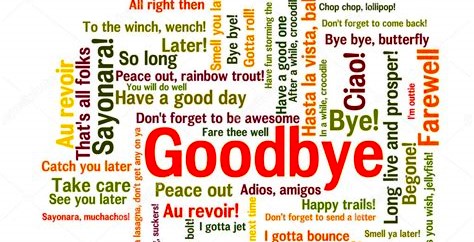A recent prompt from my Florida writers’ group asked us to make up a story about a person whose time is running out. This is my make-believe offering—
In all the years I knew him, I never heard my father use the word goodbye. Not to anyone, not ever. At every point of farewell, he’d offer up a substitute or synonym for the word—Pip-pip! So long! Good night! Cheerio! ‘Til next time! Toodle-oo! See you later! Take care!
Occasionally, he’d venture a foreign language—Adieu! Auf Wiedersehen! Adios! Sayonara! Towards the end of his life, he came to favour Ciao for now! But he’d never use the word goodbye, and I used to wonder why.
He tried to explain it once to a mildly-curious, teenaged son. “The word is too permanent, that’s all. It implies the end, the finish, that there’ll be nothing to follow. I prefer to think I’ll be meeting the other person again.” But I confess, I didn’t really see the difference, callow as I was.

Although born and raised in Canada, my father was an Oxonian—a graduate of Oxford University, Balliol College, class of 1932, a member of the rowing club—and among his lecturers were C.S. Lewis and the great J.R.R. Tolkien. Gainfully employed back in Canada with a PhD in Literature, he was one of the earliest to enlist after Canada went to war in 1939. He served as a medical orderly until demobbed in 1943, when he returned home in time for my birth.
“Despite our best efforts to save them, we lost a lot of good fellows,” he would reflect from time to time in his later years. “We knew their time was running out, but I never said goodbye to any of them. I wanted them to believe there was still more to come.”
Somewhere over there, with his comrades at Oxford or in the obscene battlefields, he learned a nonsensical, British ditty about farewells, not goodbyes, and he used to sing it to me and my siblings from time to time, usually when we balked at having to go to bed. He was an enthusiastic, if somewhat undisciplined, singer, but we came to love that song.
Eventually, of course, the fateful day arrived, as it does for all of us, that my father’s own time was running out. Home from hospital for the last time in the deep mid-winter, he was with my mother and their five children and our spouses—the ‘dirty dozen’, as we had long styled ourselves. We all knew the end was nigh, though none acknowledged it, and small talk prevailed until my father raised a frail hand. We waited, breath bated, and in a faltering voice between short gasps for breath, he sang that song one final time—his way of letting us know this was not goodbye.
Most of us, I suspect, did not believe that, but no one let on.
A few months later, when the frost had left the ground, we gathered again at the family’s burial plot for my father’s interment, joined this time by his grandchildren, his sister, his nieces and nephews, and a few cousins. In keeping with his wishes, it was a simple ceremony, and two of us spoke on behalf of the group before his ashes were lowered into the grave by his eldest grandchildren. And then we all stood around, staring awkwardly at the ground, as if reluctant to leave.

At that point, with an exquisite sense of timing, my younger brother stepped forward and began to sing our father’s farewell nonsense-song, his voice soft but firm. Before he could finish the first line, all of us who knew it had joined in—a sad farewell, yet a joyous acknowledgment that this was not goodbye.
Pip! Pip! Toot-toot, Godspeed,
Toodle-oo, toodle-oo, toodle-oo,
Ta-ta, old bean, Ting-ting, old thing,
Chuckeroo, Chuckeroo, Chuckeroo!
This parting brings us sorrow,
We hate to say adieu,
So, we’ll say Ting-a-ling, old tin of fruit,
Cheerio, cheerio to you!
Now, within hailing-distance myself of the age at which he died, I think of my father often, and I hear that little ditty echoing in my mind, just as he sang it so many years ago.
“Cheerio, Dad,” I murmur each time. “Ciao for now!”
